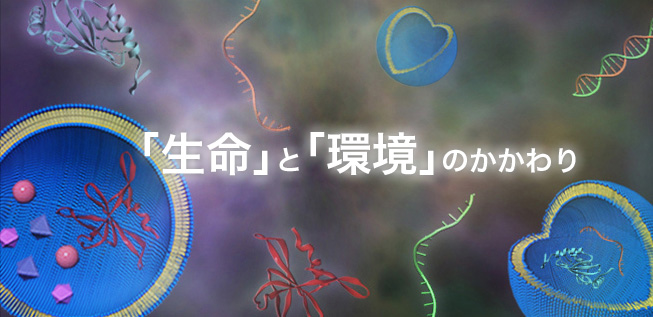
Establishing a sustainable society is one of the great modern concerns and the importance of an undegraded environment is well-recognized. Many chemicals have been released into the environment as a result of the great advances in synthetic chemistry that support our modern society.
However, despite much concern about possible harmful effects of these chemicals, their actual biological effects on humans and wildlife remain unclear. It is self evident that in order to develop and use these chemicals properly, understanding their effects on various organisms in the first place is essential. Our laboratory studies the biological responses elicited by environmental chemicals and is establishing a new system for evaluating how these chemicals affect humans and wildlife.

Genomics and Environment
In order to clarify the effects of chemicals on organisms, we applied ‘omics technologies. This approach enables us to classify many chemicals based on their biological effects and can predict how chemicals with an unknown biology will affect living organisms. This approach can lead to the identification of new biomarkers and the establishment of a new system for chemical evaluation.
Chemicals and Target Molecules
Once a chemical has been shown to affect an organism, it is important to understand which molecular targets mediate the chemical effect. Therefore, identifying the target(s) through which the chemical(s) act aids in understanding how they act and can also lead to the development of new sensors to detect the chemicals in the environment.
Model Organism from Ecosystem
Restricting our understanding of chemical action to their effects on mammals and other vertebrates is inconsistent with establishing a sustainable environment. Since the world’s waters are crucial for all life, we are particularly interested in aquatic organisms such as the water flea (Daphnia magna) as model organisms that represent ecosystem health.We apply molecular biological and ‘omics technologies to clarify the effects of chemicals on the environment. This “ecotoxicogenomic” approach is promising for evaluating chemical risks on ecosystems as well as finding useful and potentially unsuspected functions of the same chemicals.
- 2022/05/04
- Pijar-san’s paper has been chosen not only as the Top 10 Exceptional Papers of 2021 but also as the 2021 SETAC's Best Student Paper Award in Environmental Toxicology and Chemistry
- 2022/02/15
- D3 Student, Rizky Mutiara Fatimah's paper was published at「Scientific Reports」
- 2022/02/14
- M1 Student, Ayano Hara was awarded best presenter at Mid Term of Biotechnology Department(Japanese course). link
- 2021/09/13
- D3 Student,Christelle Alexa Garcia Perez was awarded Excellent Research AWARD at the 22nd Annual Meeting of the RNA Society of Japan.link
- 2021/07/28
- D3 Student,Christelle Alexa Garcia Perez's paper was published at 「PLOS Genetics」
- 2021/04/01
- D3 Student, Nguyen Duc Nhan's paper was published at 「Scientific Reports」
- 2021/03/10
- D3 Student, Pijar Religia's paper was published at 「Environmental Toxicology and Chemistry」
We are always looking for prospective students to join the laboratory and enjoy the science.
Prospective students who are intersted and wanting to know more about the laboratory and the research, please contact Professor Hajime Watanabe, or Associate Professor Yasuhiko Kato or Assistant Professor Nikko Adhitama by email.
